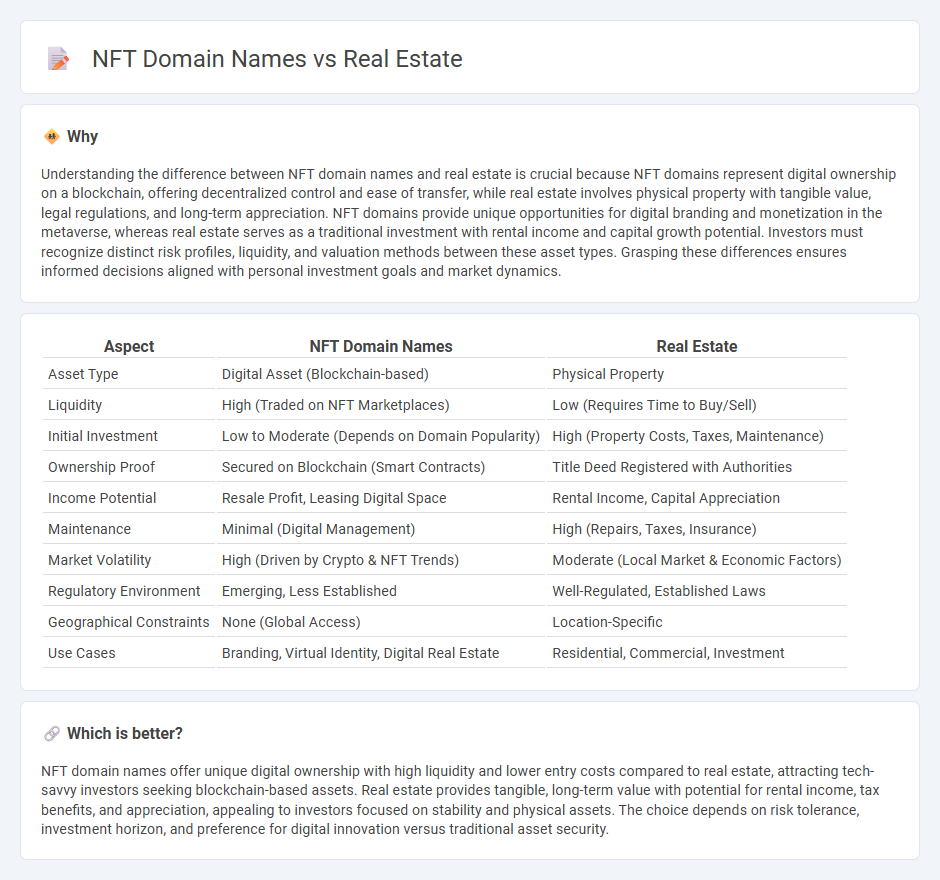
NFT domain names represent a digital asset class offering unique ownership and transferability on blockchain platforms, contrasting with traditional real estate's tangible property and long-standing market stability. Investment in NFT domains allows for lower entry costs, greater liquidity, and global accessibility compared to the high capital requirements and physical constraints of real estate. Discover the key differences and strategic advantages to decide which investment suits your portfolio goals.
Why it is important
Understanding the difference between NFT domain names and real estate is crucial because NFT domains represent digital ownership on a blockchain, offering decentralized control and ease of transfer, while real estate involves physical property with tangible value, legal regulations, and long-term appreciation. NFT domains provide unique opportunities for digital branding and monetization in the metaverse, whereas real estate serves as a traditional investment with rental income and capital growth potential. Investors must recognize distinct risk profiles, liquidity, and valuation methods between these asset types. Grasping these differences ensures informed decisions aligned with personal investment goals and market dynamics.
Comparison Table
| Aspect | NFT Domain Names | Real Estate |
|---|---|---|
| Asset Type | Digital Asset (Blockchain-based) | Physical Property |
| Liquidity | High (Traded on NFT Marketplaces) | Low (Requires Time to Buy/Sell) |
| Initial Investment | Low to Moderate (Depends on Domain Popularity) | High (Property Costs, Taxes, Maintenance) |
| Ownership Proof | Secured on Blockchain (Smart Contracts) | Title Deed Registered with Authorities |
| Income Potential | Resale Profit, Leasing Digital Space | Rental Income, Capital Appreciation |
| Maintenance | Minimal (Digital Management) | High (Repairs, Taxes, Insurance) |
| Market Volatility | High (Driven by Crypto & NFT Trends) | Moderate (Local Market & Economic Factors) |
| Regulatory Environment | Emerging, Less Established | Well-Regulated, Established Laws |
| Geographical Constraints | None (Global Access) | Location-Specific |
| Use Cases | Branding, Virtual Identity, Digital Real Estate | Residential, Commercial, Investment |
Which is better?
NFT domain names offer unique digital ownership with high liquidity and lower entry costs compared to real estate, attracting tech-savvy investors seeking blockchain-based assets. Real estate provides tangible, long-term value with potential for rental income, tax benefits, and appreciation, appealing to investors focused on stability and physical assets. The choice depends on risk tolerance, investment horizon, and preference for digital innovation versus traditional asset security.
Connection
NFT domain names and real estate intersect through the concept of digital property ownership, where NFT domains represent unique, blockchain-verified virtual assets akin to physical real estate titles. Both markets leverage scarcity and exclusivity, generating investment opportunities based on location value in the digital or physical realm. Investors in NFT domains and real estate benefit from asset appreciation, rental income potential, and portfolio diversification, merging traditional property principles with decentralized technology.
Key Terms
Liquidity
Real estate domain names offer stable, long-term value with limited liquidity due to traditional transaction processes and market constraints. NFT domain names provide enhanced liquidity through blockchain technology, enabling faster buying, selling, and trading in decentralized marketplaces. Explore the evolving dynamics of liquidity between these asset classes to optimize your investment strategy.
Ownership Transfer
Real estate ownership transfer involves a legal process requiring deeds, title searches, and registration with government authorities to ensure clear and enforceable property rights. NFT domain names transfer ownership through blockchain technology, enabling instant, secure, and transparent transactions without traditional intermediaries. Explore the nuances of ownership transfer in these two asset classes to understand their distinct advantages and challenges.
Source and External Links
Real estate - Wikipedia - Real estate refers to property consisting of land and the buildings on it, including natural resources such as crops, minerals, water, and wild animals, and involves various types of residential and commercial property as well as considerations for environmental impact and sustainability.
Illinois Real Estate & IL Homes For Sale - Trulia - Trulia lists over 34,000 homes for sale in Illinois, with detailed property information, photos, and open house notices for prospective buyers and renters.
Chicago, IL Homes for Sale & Real Estate - Realtor.com - Realtor.com features nearly 10,000 current home listings in Chicago, Illinois, with a median listing price of $349,900, offering comprehensive tools for exploring available properties in the city.
 dowidth.com
dowidth.com